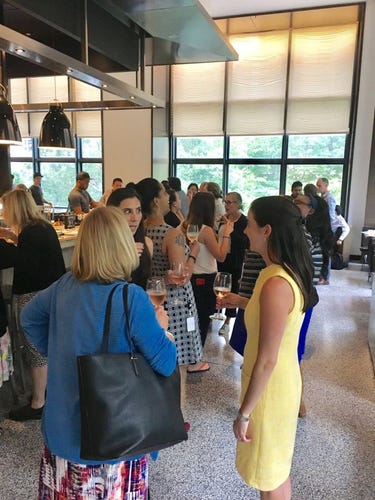Trending
Opinion: How will Project 2025 impact game developers?
The Heritage Foundation's manifesto for the possible next administration could do great harm to many, including large portions of the game development community.

Featured Blog | This community-written post highlights the best of what the game industry has to offer. Read more like it on the Game Developer Blogs or learn how to Submit Your Own Blog Post
Not all of us are natural networkers. If you fall into that category, here are some tips on how to network so you can get your game noticed and hopefully make some great contacts.


If you’re anything like me, when you hear the word networking, you’re already out the door. Yes, it’s important and one of the best ways to meet other developers, potential investors and fans, but it’s not something that comes naturally to most people. For some, the thought of talking to strangers might be a terrifying thought. For others, it might just seem insincere to network with people only for potential benefits. In the end, many of us end up shrugging our shoulders and say, ‘I just suck at networking’ and pretty much avoid it at all costs. However, going down that route can lead to tons of missed opportunities. So how can we grow our network?
This might sound obvious, but you can’t network if you don’t talk to people! For the shy folks, this can be a herculean task. For those who aren’t natural socialites try this trick: pick a color. Once you step into the room talk to all of the people wearing that color. You can only leave once you’ve spoken to each of them. If no one is wearing the color you had in mind, pick a number and stick to it. It can be awkward, especially if someone has a crowd of people around them, but you’ll never meet the right people if you don’t talk to them.
The best rule of thumb – try approaching groups of three or larger. It can be a bit awkward, but it’s a bit easier to infiltrate larger groups than smaller ones. After all, there will always be people in larger groups who aren’t talking at the moment, so try to strike up a conversation with them based on the general topic of the group conversation.
There’s always that one person at networking parties who schmoozes to the big guns, laughing at all their jokes and trying to butter them up. More often than not it’s the same person who leaves disappointed. Don’t be that person. Never go into a networking event expecting people to help you. Instead, find ways you could help others. Maybe you can provide some good sites for a new developer just starting off or maybe you can recommend an artist to someone else. Whatever it is, the key is to ask, “How can I help.” Instead of “What can you do for me?”
The person you’re talking with is just another human being no matter how successful or unsuccessful he or she is. So treat them as such. Listen to them and respond thoughtfully. If the conversation isn’t going anywhere or if you have nothing in common, excuse yourself politely. Networking is about human interaction and building relationships. Treat everyone, regardless of how successful they are, the same. You never know who might have a valuable connection or information.
While meeting other game developers at places like PAX or GDC can be great, don’t limit yourself to attending only industry events. Most people have multiple interests so why not take a break and follow up on these other hobbies? Take part in a local club or meetup group for something you’re interested in. It could be anything from cooking to photography. The best part? It’s usually easier to talk to people at these events because you already have a shared interest. So while you’re chatting about the latest culinary technique, ask the person with whom you’re chatting for their name and about their work.
Once you’ve gotten the contacts, don’t let them collect virtual dust in your contacts list. Reach out to them a few days after the event and reiterate how much you enjoyed meeting them with a request to meet up again in the near future. If you already set a date for a meeting, always re-confirm. Most importantly, show up. While there’s not much you can do about last minute emergencies, try your best to keep your appointment. Like you, these people are busy and if you reschedule too much, it looks like you don’t value their time or their insights. No shows are even worse. Again, you don’t know who these people might know, so standing a contact up could potentially burn a bridge you might really need.
More importantly, keep in constant contact with these people. You don’t have to email them every day, but it’s a good idea to check in one or twice a month. Maybe you found an article that might interest them, or perhaps you want to comment on an article they wrote. Always keep it professional and useful whether for their work or hobbies.
Networking isn’t easy and for many of us, it can be a nightmare. However, if you approach it more as making friends instead of business partners, it might be a bit easier.
Read more about:
Featured BlogsYou May Also Like